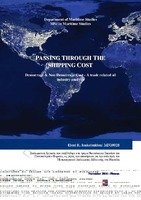| dc.description.abstractEN | Shipping is a service business which is driven and based in a global mechanism, fueled by the demand of the service and the volume of the trade; the product price, the vessel’s speed, the costs included, the reliability and the security are necessary factors for its growth. The emerging industrial economies of China and India and the massive total growth of the trade world, led to an increasing need of energy and raw materials in great volumes and in low transport cost from distanced areas. It is commonly known that the higher is the value per unit of weight, the less significant is the cost of transportation. Same is depicted by the sea transport unit cost function which is defined as the sum of the capital cost of the ship (LC), the cost of operating the ship (OPEX) and the cost of handling the cargo (CH) divided by the parcel size (PS) or the tonnage of cargo capacity (DWT). Whereas the final oil price is exclusively formed by and forming the demand for the product and the shipping cost itself, there have been several developments in diminishing the OPEX; lowering the speed average of the vessel, improving the marine propulsion system (invention of the screw propeller, ‘the double propeller’), increasing the average size of the vessel. Larger vessels mean lesser shipping cost per load unit regarding the crew, the fuel consumption, the demurrage, the insurance and the maintenance factors. As a physical consequence of the rising demand, the transportation costs fell even more. Economies of scale were exploited since the unit cost does not increase proportionally with the cargo capacity. Finally, there have been major technological advances and organizational evolution in the field of port and cargo management. Nowadays, there is an awareness level that the GDP is a leading driving factor of the oil consumption around the globe, however it is also crucial to weight the transportation cost, the shipping cost implied and its portion to the oil price formation. Objective of the thesis is to determine what the shipping cost in a trade related industry is combined from and how same is passed on from Owners to Charterers and to the trading chain, forming to some extent the final oil prices. An analytical description is given on how the oil industry works and what are the fundamentals of calculating and processing the demurrage and the non-demurrage costs. Several legal cases and a theoretical case computation are given for a better comprehension of the parameters in force. | el |



